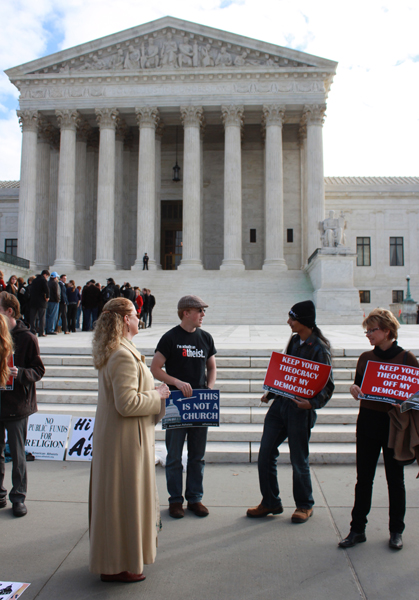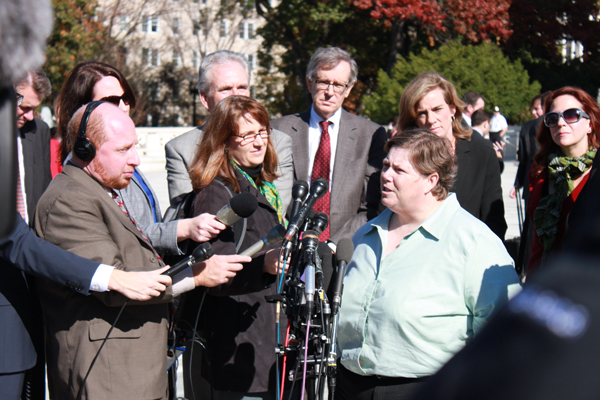WASHINGTON (RNS) The Supreme Court on Monday upheld the centuries-old tradition of offering prayers at the start of government meetings.

Demonstrators hold signs reading “Keep your theocracy off my democracy” in front of the Supreme Court on Wednesday (Nov. 6) during oral arguments of Greece v. Galloway. RNS photo by Katherine Burgess
The 5-4 decision in favor of the any-prayer-goes policy in the town of Greece, N.Y., avoided two alternatives that the justices clearly found abhorrent: having government leaders parse prayers, or outlawing them altogether.
It was written by Justice Anthony Kennedy, with the court’s conservatives agreeing and its liberals, led by Justice Elena Kagan, dissenting.
It was a narrow victory for the the town, which was taken to court by two women who argued that a plethora of overtly Christian prayers at town board meetings violated their rights.
While it has upheld the practice of legislative prayer, most recently in a 1983 case involving the Nebraska legislature, the case of Town of Greece v. Galloway presented the justices with a new twist: mostly Christian clergy delivering frequently sectarian prayers before an audience that often includes people with business to conduct.
The court’s ruling said that the alternative — having the town board act as supervisors and censors of religious speech — would involve the government far more than the town was doing by simply inviting any clergy to deliver the prayers.
“An insistence on nonsectarian or ecumenical prayer as a single, fixed standard is not consistent with the tradition of legislative prayer outlined in the court’s cases,” Kennedy said.
Kagan, joined by the court’s other three liberal justices, said the Town of Greece prayers differed from prayers delivered to legislators about to undertake the people’s business. In Greece, she said, sectarian prayers were delivered to “ordinary citizens,” and their participation was encouraged.
“No one can fairly read the prayers from Greece’s town meetings as anything other than explicitly Christian — constantly and exclusively so,” Kagan said. “The prayers betray no understanding that the American community is today, as it long has been, a rich mosaic of religious faiths.”
The legal tussle began in 2007, following eight years of nothing but Christian prayers in the town of nearly 100,000 people outside Rochester. Susan Galloway and Linda Stephens, a Jew and an atheist, took the board to federal court and won by contending that its prayers – often spiced with references to Jesus, Christ and the Holy Spirit — aligned the town with one religion.
Once the legal battle was joined, town officials canvassed widely for volunteer prayer-givers and added a Jewish layman, a Wiccan priestess and a member of the Baha’i faith to the mix. Stephens, meanwhile, awoke one morning to find her mailbox on top of her car, and part of a fire hydrant turned up in her swimming pool.
The two women contended that the prayers in Greece are unconstitutional because they pressure those in attendance to participate. They noted that unlike federal and state government sessions, town board meetings are frequented by residents who must appear for everything from business permits to zoning changes.

Susan Galloway, a resident of the town of Greece, New York, who filed a lawsuit against the town, speaks to the media after oral arguments at the Supreme Court in Washington, D.C. on Nov. 6, 2013. RNS photo by Katherine Burgess
But several justices had worried that virtually no prayer would satisfy everyone, leaving the court little option but to reiterate its support of legislative prayer or remove it entirely from government meetings — something they clearly did not want to do.
The court’s 30-year-old precedent, Marsh v. Chambers, upheld the Nebraska legislature’s funding of a chaplain who delivered daily prayers. Chief Justice Warren Burger ruled then that such prayers were “part of the fabric of our society.” The decision prohibited only those prayers that take sides by advancing or disparaging a particular religion.
Since Marsh, backers of church-state separation have made modest gains. In 1984, Justice Sandra Day O’Connor’s “endorsement test” established that every government practice must be judged to determine whether it endorses one religion. In 1989, the court ruled that a Christmas crèche display on a courthouse staircase went too far by endorsing Christianity and brought forth O’Connor’s “reasonable observer” test. O’Connor was in court for Wednesday’s arguments.
The current court, with its 5-4 conservative tilt, agreed to consider the case following a federal appeals court’s ruling against the town. Judge Guido Calabresi of the 2nd Circuit Court of Appeals said its actions “virtually ensured a Christian viewpoint” and featured a “steady drumbeat of often specifically sectarian Christian prayers.”
The Obama administration came down forcefully on the town’s side — most notably because both houses of Congress have opened with prayers since 1789.
The case hinged on these words from the First Amendment: “Congress shall make no law respecting an establishment of religion, or prohibiting the free exercise thereof.” That has come to be known as the Establishment Clause.
The House and Senate have had chaplains on staff since 1789. But the prayers delivered these days by Senate Chaplain Barry Black and House Chaplain Patrick Conroy are far less sectarian than those heard in churches, temples and synagogues.
Most state legislatures open their sessions with a prayer, nearly half of them with guidelines. Many county legislatures open meetings with a prayer, according to an informal survey by the National Association of Counties. National data on prayer practices at the city, town and village levels do not exist.
The Supreme Court cracked down on prayer in schools in the 1960s, ruling against Bible readings, the Lord’s Prayer or an official state prayer.
In Lemon v. Kurtzman, a 1971 case involving religion in legislation, the high court devised what became known as the “Lemon test.” Government action, it said, should have a secular purpose, cannot advance or inhibit religion and must avoid too much government entanglement with religion.
Then came Marsh, in which the court gave a green light to legislative prayer that does not advance or disparage any faith.
YS END WOLF




